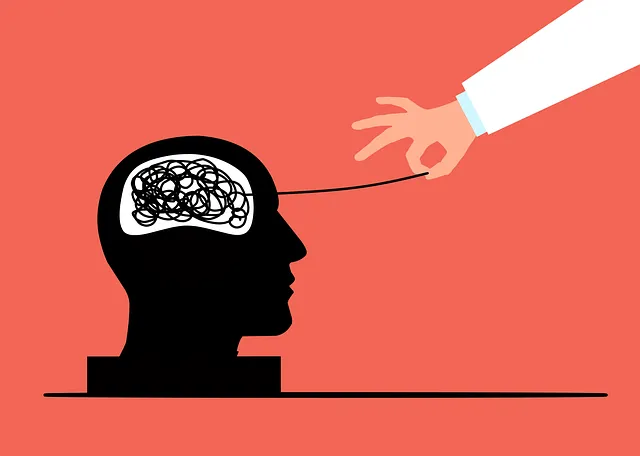The article emphasizes the overlooked connection between social skills and mental health, highlighting how conditions like anxiety and depression impact social interactions. Highlands Ranch Kaiser Permanente mental health providers recognize this link, integrating holistic approaches that address social skills alongside symptom management. They offer specialized services like Mental Wellness Journaling Exercise Guidance and Mood Management strategies to empower individuals in navigating social environments, improving emotional regulation, and fostering better outcomes. Through rigorous risk assessments, structured group therapy sessions, burnout prevention programs, and community outreach, these providers enhance patients' quality of life and promote comprehensive mental wellness support.
Social skills training is a powerful tool in supporting individuals with mental health conditions, fostering better connections and overall well-being. This comprehensive guide explores the intricate link between social interaction and mental health, highlighting the vital role played by Highlands Ranch Kaiser Permanente mental health providers in offering specialized training. From understanding common challenges like anxiety and depression to implementing effective strategies, this article provides insights into enhancing social skills and improving lives.
- Understanding the Link Between Social Skills and Mental Health
- The Role of Kaiser Permanente Mental Health Providers in Training
- Identifying Challenges: Common Mental Health Conditions and Social Interaction
- Effective Strategies for Improving Social Skills
- Implementing Training Programs: Tips from Highlands Ranch Kaiser Permanente Experts
Understanding the Link Between Social Skills and Mental Health

The connection between social skills and mental health is a significant aspect often overlooked in traditional therapy settings. Many mental health conditions can impact an individual’s ability to navigate social interactions, leading to feelings of isolation and further exacerbating their condition. For instance, individuals with anxiety disorders might struggle with initiating conversations or maintaining eye contact, while those with depression may find it challenging to express their emotions or engage in group activities. Recognizing this link is crucial for Highlands Ranch Kaiser Permanente mental health providers as it opens doors to more holistic treatment approaches.
At-times, the journey towards mental wellness involves not just addressing symptoms but also learning and practicing essential social skills. Mental Wellness Journaling Exercise Guidance can be a powerful tool to help individuals process their emotions and improve their ability to connect with others. Additionally, Risk Management Planning for Mental Health Professionals plays a vital role in ensuring therapists are equipped to guide clients through complex social situations, fostering better outcomes. Mood Management strategies integrated into therapy sessions can empower individuals to regulate their emotions during interactions, leading to more fulfilling relationships and improved overall mental health.
The Role of Kaiser Permanente Mental Health Providers in Training

Highlands Ranch Kaiser Permanente mental health providers play a pivotal role in fostering comprehensive care for individuals managing various mental health conditions. Their expertise extends beyond clinical treatment, encompassing a crucial aspect of recovery: social skills training. These professionals are adept at recognizing the profound impact that effective communication, empathy, and interpersonal interactions can have on an individual’s well-being.
By integrating social skills training into their practice, Highlands Ranch Kaiser Permanente mental health providers empower patients with tools to navigate social environments more confidently. This includes strategies for mood management and anxiety relief in various settings, enhancing their overall quality of life. Furthermore, they conduct thorough risk assessments for mental health professionals, ensuring a safe and supportive learning environment that promotes positive outcomes for all participants.
Identifying Challenges: Common Mental Health Conditions and Social Interaction

In many cases, individuals with mental health conditions face unique challenges when it comes to social interactions. Common disorders such as anxiety, depression, and schizophrenia can significantly impact an individual’s ability to communicate, connect, and engage in group settings. For instance, people struggling with social anxiety might experience intense fear or discomfort in various social situations, hindering their opportunities for meaningful relationships and community involvement. Similarly, individuals with depression may struggle to initiate conversations or maintain eye contact, leading to feelings of isolation and further contributing to their low mood.
Highlands Ranch Kaiser Permanente mental health providers recognize these challenges and offer specialized services tailored to address them. Mental wellness coaching programs and resilience-building workshops have proven effective in helping clients develop essential social skills. Through these initiatives, individuals learn strategies to navigate social situations more confidently, improve their communication abilities, and foster healthier relationships. By participating in such development programs, folks can enhance their mental wellness while gaining the tools needed to thrive in various aspects of life, including work, education, and community activities.
Effective Strategies for Improving Social Skills

Social skills training plays a pivotal role in enhancing mental health conditions, especially for individuals seeking support from Highlands Ranch Kaiser Permanente mental health providers. Effective strategies for improving social skills include structured group therapy sessions that encourage active participation and provide a safe space for practice. These sessions focus on teaching essential communication techniques, such as active listening, empathy, and assertiveness, which are crucial for building and maintaining meaningful relationships.
Additionally, Burnout Prevention Strategies for Healthcare Providers can be integrated into social skills training to foster resilience and emotional well-being. Community Outreach Program Implementation also proves beneficial by connecting individuals with support networks, promoting mental wellness, and reducing feelings of isolation. Through these comprehensive approaches, Highlands Ranch Kaiser Permanente mental health providers can empower their clients to navigate social interactions more confidently, ultimately improving their overall mental health and quality of life.
Implementing Training Programs: Tips from Highlands Ranch Kaiser Permanente Experts

Implementing Training Programs is a strategic step toward enhancing mental health support, and the experts at Highlands Ranch Kaiser Permanente are sharing their insights on this journey. Mental health providers play a pivotal role in fostering resilience and well-being among their patients, making continuous learning and skill development crucial. The team emphasizes the importance of tailored programs that address specific challenges within the healthcare sector.
Highlands Ranch Kaiser Permanente mental health professionals recommend integrating Self-Care Practices into training curricula to prevent Burnout Prevention Strategies for Healthcare Providers. By incorporating techniques like mindfulness, stress management, and effective communication skills, these programs can empower providers to maintain their own Mental Wellness Coaching Programs Development while offering compassionate care. This holistic approach ensures that healthcare professionals remain dedicated and engaged in supporting the mental health of their communities.
Social skills training is a powerful tool that can significantly improve the lives of individuals with mental health conditions. As demonstrated by the expertise of Highlands Ranch Kaiser Permanente mental health providers, integrating these programs into care plans can foster better social interactions and overall well-being. By understanding the unique challenges associated with various mental health disorders and employing effective strategies, we can create a more supportive environment for those seeking help. This approach not only enhances recovery but also strengthens communities, ensuring that individuals with mental health conditions feel included and valued.



